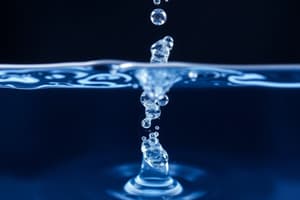Podcast
Questions and Answers
What ability does water have that differs from most other solvent molecules?
What ability does water have that differs from most other solvent molecules?
Form hydrogen bonds and participate in electrostatic interactions.
What is a measure of a solvent’s ability to diminish the electrostatic attractions between dissolved ions?
What is a measure of a solvent’s ability to diminish the electrostatic attractions between dissolved ions?
- Dielectric constant (correct)
- Surface tension
- Viscosity
- Polarity
The higher the dielectric constant of a solvent, the more able the ions are to associate with each other.
The higher the dielectric constant of a solvent, the more able the ions are to associate with each other.
False (B)
What happens to salt when it dissolves in water?
What happens to salt when it dissolves in water?
The dissolved particle in a solution is called a ______.
The dissolved particle in a solution is called a ______.
What is the concentration of glucose in human blood?
What is the concentration of glucose in human blood?
How many water molecules surround each glucose molecule in a 5 mM glucose solution?
How many water molecules surround each glucose molecule in a 5 mM glucose solution?
Biological molecules are usually found alone in very dilute conditions in vivo.
Biological molecules are usually found alone in very dilute conditions in vivo.
Flashcards are hidden until you start studying
Study Notes
Properties of Water as a Solvent
- Water molecules can form hydrogen bonds and engage in electrostatic interactions with various compounds.
- High dielectric constant of water reduces electrostatic attractions between dissolved ions, facilitating solubility.
- The stronger interactions between polar water molecules and ions (e.g., Na+ and Cl−) lead to the dissolution of ionic compounds like salt.
Solvation Process
- Ions in a dissolving ionic compound become surrounded by water molecules, a process known as solvation or hydration.
- Solvated ions are stabilized as polar water molecules align their charges with the oppositely charged ions, overcoming ionic attraction.
Biological Molecules and Solubility
- Polar or ionic functional groups in biological molecules enhance solubility due to their ability to form hydrogen bonds with water.
- Glucose, possessing six hydrogen-bonding oxygen atoms, is particularly soluble in water.
Glucose in Biological Context
- Typical concentration of glucose in human blood is approximately 5 mM.
- In a 5 mM glucose solution, there are roughly 10,000 water molecules for every glucose molecule, underscoring the solvent's abundant presence (55.5 M concentration).
Observations on Molecular Behavior
- Discussion on individual molecules typically reflects general behavior due to the vast number of molecules involved in biological systems.
- Biochemical analyses commonly cannot evaluate the activity of single molecules due to these high concentrations and interactions in vivo.
Studying That Suits You
Use AI to generate personalized quizzes and flashcards to suit your learning preferences.




